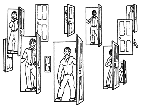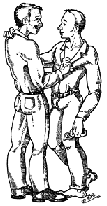Coming Out and Staying Out
A Guide For Gay and Bisexual Men
This guide has been written for gay and bisexual men of all ages who are thinking of coming out. We know that making the decision to come out can be scary and stressful. It is for these reasons and because of our work as gay men's health workers that we put together this guide. We believe that useful information and other people's experiences of coming out can help to prepare you for some of the consequences that coming out to family and friends may bring.
 Coming out is different for every person. We have tried to answer some of the questions that we are regularly asked, although in reality, this guide is likely to prompt more questions than it answers, but we hope it will help you during this time.
Coming out is different for every person. We have tried to answer some of the questions that we are regularly asked, although in reality, this guide is likely to prompt more questions than it answers, but we hope it will help you during this time.
Remember - there is always someone you can talk to. There are many organisations that can help with your questions and concerns about being gay or coming out and we have listed some of them on the information page of this guide.
This guide has been written with the United Kingdom in mind, please remember if you live outside the UK that some of the information will not apply to where you live. For example, in some countries being homosexual is still illegal, or attitudes towards being gay or bisexual can be so severe that coming out is not safe. Use the web to look for more information about how things are where you live.
Good Luck!
Douglas Newberry and Mark Rendell
What Does Being Gay Mean
In simple terms, being gay means that you are sexually attracted to members of your own sex and that you identify with other gay people or the larger gay community. Sexuality is a term used to describe a whole range of feelings, desires and actions relating to sex.
Why Am I Gay?
Nobody knows for sure why some of us are gay and some of us are not. Lots of theories have been put forward ranging from genetic differences to overbearing parents. The evidence so far suggests that random genetic factors play a part in determining our sexuality in the same way they play a part in determining, for example, lefthandedness.
One thing we do know is that no-one chooses their sexuality. Some gay people knew they were different, if not gay, from as young as five or six. It is said that, for most of us, our sexuality is determined by the age of 12 or 13 and probably 16 at the latest. By and large, society tends to assume that everyone is, or wants to be, heterosexual. This is known as heterosexism. Some people continue to believe that it is a choice and that we can be persuaded into heterosexuality. By assuming heterosexuality, society gives rise to the dilemma, for those of us who know we are gay, of whether to hide our sexuality or to come out - with all that this entails.
There have been small but perceptible changes in the way British society views homosexuality, but there is a long way to go before it will accept us in the same way as it does people who are, say, lefthanded. This has more to do with society's hang-ups around sex and sexuality than individual gay people. Often, once people know someone who is gay, their prejudices and fears about homosexuality disappear all together.
Growing Up Gay
For many young gay or bisexual people, adolescence can be a time of particular anxiety and fear. Many lesbians and gay men look back on this part of their lives with sadness and regret. There are very few positive gay role models and a lot of hostility towards openly gay people. Gay teenagers often become painfully aware that they are not like other people and many become withdrawn and lonely, convinced that only they are feeling this way. They learn to hide their true feelings or act as others want them to, for fear of being ostracised, ridiculed or rejected by loved ones and friends.
Above all, there can be a sense that we are somehow different, that we are abnormal and that we are going to disappoint people.
Some people believe that if they get married their gay feelings will disappear. It is unusual for this to happen. Most store up a great deal of stress and anxiety for their later years. Coming out as a gay parent has particular challenges. Breaking out of a clearly defined role, or even attempting to shift the definition of it, involves tremendous courage and strength. The conflict between their relationship with their spouse and family and their need to be themselves can be enormous.
Coming Out
There are several stages in the process of coming out. It's your life so take your time - do things for you and only when you are ready.
Coming Out To Yourself
Acknowledging that you are gay can take many years. Some of us probably hoped these feelings were "just a phase". In time, we realise that these feelings are not just a phase and we have to find a way of accepting them and dealing with the fact that we are sexually attracted to members of our own sex.
 This realisation is the first stage of coming out. There is no hard and fast rule when this point is reached. For some it happens in their teens, for others it may happen much later in life.
This realisation is the first stage of coming out. There is no hard and fast rule when this point is reached. For some it happens in their teens, for others it may happen much later in life.
Some people describe this time of accepting their sexuality as though they were riding an emotional rollercoaster. One day they felt happy and confident and ready to tell everyone; the next they felt confused, scared and relieved that they hadn't. You may want to talk to someone who understands what this is like. We have included details of a number of organisations in the United Kingdom that can help on the GMHP Directory.
So You Still Want To Come Out
This is a nerve racking time - the fear of rejection is likely to be immense. Bear in mind that there are many ways to tell someone that you are gay.
It may be helpful to ask yourself some of the questions that come up later in this guide, as it is more than likely that others will ask you them at some point. Don't rehearse your answers but think of your reasons - it will make you and your discussions stronger and more assured.
Coming Out To Others
The next stage involves going public in some way, of "coming out of the closet". Who you tell next is really up to you. You may decide to tell your best friend or a member of your family.
Remember, once you have told someone about your sexuality it can become known to others within a short period. This is human nature and there is very little you can do to prevent this. If you are resolved to deal with any negativity that this disclosure may bring, you will be sufficiently prepared for it.
Why Do I Want To Come Out
This is the most important question to ask yourself. If you answer something like: "Because I'm proud of who I am" or "It is impossible to become a fully happy human being if my sexuality remains suppressed" or "I want to meet other gay people" then these are good reasons. Think very carefully if your reasoning is to hurt or shock people. Often the person who gets hurt will be you.
Who Should I Tell
 Many gay people describe how important it is to first tell someone outside the family. Make sure it's someone you trust and who you believe to be open minded and supportive. Be careful if you decide to confide in a teacher at school - they may be obliged to tell someone else what you have told them. Find out the school policy on confidentiality before you go ahead.
Many gay people describe how important it is to first tell someone outside the family. Make sure it's someone you trust and who you believe to be open minded and supportive. Be careful if you decide to confide in a teacher at school - they may be obliged to tell someone else what you have told them. Find out the school policy on confidentiality before you go ahead.
If you have decided to tell your family it may be easier to talk to one parent before the other. You could then ask them for help to approach the other. Sometimes brothers and sisters are a good starting point as they are likely to understand more about homosexuality or bisexuality. Make sure you understand why you are going to tell them. One of the best reasons to come out to your family is to become closer to them.
There are a number of typical responses that parents, particularly, are known to say: "How can you be sure?", "I went through a phase like this at your age", "You'll grow out of it", "You haven't tried hard enough with the opposite sex" and "How can you know at your age?"
We have listed them here because they may help you to think of your answers to them. You might find it helpful to discuss these questions first with a trusted friend or a lesbian and gay helpline or switchboard. See the GMHP Directory for details.
Support For Your Family
This can be a traumatic time for some members of your family. You may feel unable to answer all their questions or to deal with all of the issues that come up for them. They, in turn, may not feel comfortable talking about homosexuality or bisexuality with you. There are several organisations that offer support to parents who are coming to terms with their sons' and daughters' sexuality. Acceptance produces booklets written for parents - you can request copies from the address given on the GMHP Directory national organisations page.
This can be a difficult time if your happiness is dependent to some degree on your family's reaction. If this is the case for you, we would advise that you talk it over with someone who has been through it already - perhaps your local gay switchboard or helpline.
How Should I Tell Them
There is no rule that says you have to sit down and talk to others about this, there are other ways.
 You might like to write to them first and give them time to react in their own way. This is probably a better approach if, for example, you live a long way from your family or friends. Remember that you have probably taken a long time to get used to the idea yourself and others might need the same amount of time. Writing a letter allows you to take your time and to compose your thoughts carefully and clearly. It can also give the person you are writing to space to react and consider the news before discussing it with you. This could be a useful approach if you are expecting a very hostile or negative reaction.
You might like to write to them first and give them time to react in their own way. This is probably a better approach if, for example, you live a long way from your family or friends. Remember that you have probably taken a long time to get used to the idea yourself and others might need the same amount of time. Writing a letter allows you to take your time and to compose your thoughts carefully and clearly. It can also give the person you are writing to space to react and consider the news before discussing it with you. This could be a useful approach if you are expecting a very hostile or negative reaction.
If you decide to talk face to face, remember not to rush it or to do it when one of you is in a hurry or distracted. It probably won't help to memorise a script either - you can guarantee that some people do not respond in a predictable manner. If you are worried about their reaction, tell them of your fears and that you don't want to hurt them but need to be honest with them. Remember to listen to what they have to say - it should be along the lines of a chat, not a speech!
When Should I Tell Them
When it comes to coming out, timing is an important consideration. Choose the moment carefully - do it when you (and they) have lots of time - not last thing at night when you are likely to be more tired and emotional.
Think about the way you are feeling, allowing for nerves, which are perfectly natural under the circumstances, don't do it if you are feeling angry or emotionally sensitive - this will affect what you say and how you say it. For obvious reasons, don't do it when you are drunk (even if you think you need a drink to steady your nerves).
And remember - only when you are good and ready. A friend once said that he knew he was ready to tell his family only when he realised that, if he had to, he could live without their support. Fortunately for him (and his family), this didn't happen.
Consequences and Reactions
So you've told someone. You are either balancing on the edge of an erupting volcano or dancing with joy on the moon (or both!). Some people describe a huge weight being lifted from their shoulders, of feeling euphoric and giggly and childlike again.
Don't feel guilty about it - go on and enjoy yourself, you deserve it. The thrill of revealing something long kept hidden can give a tremendous sense of relief.
Use this new found energy wisely and remember that close friends and family may be worried that you have changed out of all recognition. Reassure them that you have changed - and for the better and that you are simply exploring a new, more complete you.
Most people will experience many positive reactions. For example, "We're so pleased you could tell us" or "Well we had already guessed and were just waiting for you to say something". Some gay people have also met with the response, "So am I".
"My parents refused to talk about it. They dismissed it and said they didn't want the subject brought up again. I decided that I was going to continue to live my life as a gay man. I stopped going home as often as I used to and attending family occasions. It is only now, three years later, that they have begun to broach the subject with me."
If it hasn't gone too well - don't lose heart. Time is a great healer and things will get better. If you are experiencing rejection from some close friends, ask yourself if they were really so close that they couldn't support you through this. If your family is reacting badly, this is in all probability, normal. They may be experiencing a whole range of emotions including shock, grief, guilt, blame, disappointment and lots of pain.
"My family say that they accept that I am gay but they don't want to see me being affectionate with another man. They say that they won't be able to cope with it."
Remember how long it took for you to come to terms with being gay. Many parents will feel a loss in some way - perhaps of future grandchildren or weddings and other family gatherings. This can blur their happiness and their love for you.
"I was at a wedding recently and everyone was there with their partners. I was upset that I couldn't bring mine. Everyone asked the usual embarrassing questions about girlfriends and I just had to smile and make excuses. I didn't want to row with my family about it but it's just not fair."
At the end of the day, your parents are still your parents and, in time, few reject their children because they are gay.
"My dad said, "You're still my son and I'm proud of you." He'd been very homophobic up to then."
If they go quiet on you, give them time to react and the opportunity to think about what you have told them. If they ask lots of questions, it's a good sign. It may help to think of it as though it is in your interests to respond to them - they are likely to be the same ones that you have asked yourself many times along the way.
If things are so bad that you feel like giving up with the whole process of coming out, it's important to talk to someone about your fears and concerns. Again your local switchboard, helpline or Gay Men's Health Project can offer you support and guidance.
 It's probably better to persevere and keep going, after all, you have come this far and in many ways it would be difficult or impossible to go back now. The next person you talk to will probably give you a huge hug and say that they were relieved that you had found the courage to tell them and that they had suspected that something may have been on your mind for a long time.
It's probably better to persevere and keep going, after all, you have come this far and in many ways it would be difficult or impossible to go back now. The next person you talk to will probably give you a huge hug and say that they were relieved that you had found the courage to tell them and that they had suspected that something may have been on your mind for a long time.
Coming Out At Work
There are some circumstances where coming out could seriously affect your job security and promotion prospects. In some circumstances, being openly gay could be in contravention of the rules of the employer, for example the Armed Forces, probation services, some non-metropolitan police forces and prisons.
The Armed Forces
Because of changes in the law, this section of the coming out guide is not currently up to date ... we have therefore decided to remove it until a new version is written. However, if you work for the Armed Forces and you wish to seek the latest information, or need to talk to someone about your sexuality, contact a confidential service such as a local gay switchboard or talk to experienced counsellors at Rank Outsiders or At Ease (phone numbers on the GMHP Directory national information page).
Prisons
In some prisons where the prison culture is particularly homophobic, gay prisoners, including those on remand, risk harassment, abuse and violence. An address for Gay Rights in Prison appears on the GMHP Directory national organisations page.
Telling Your Doctor
It is worth mentioning, too, that if you disclose your sexuality to your general practitioner (doctor), they may record these details in your medical records. These medical records can be accessed by a range of organisations for many different purposes.
Meeting Other Gay People
There comes a time to stop talking and to get on with living your (new) life exactly how you want to. It's time to meet other gay and bisexual people and to explore your sexuality safely and confidently.
A common reaction to this statement, especially in rural areas is, "Fine - but where do I start?" Remember that being gay is about expressing yourself in the way YOU want to. Despite the stereotypes, there is no single way of being gay. We are all as different as any other group of people.
 Going out with friends and meeting new ones at clubs or parties can be great. But the scene isn't for everybody and it's not everything there is to being gay. Most towns and cities have gay social groups and gay men's health projects. These can be excellent places to meet new people and to find out what there is to do locally and most will arrange to meet first time visitors beforehand.
Going out with friends and meeting new ones at clubs or parties can be great. But the scene isn't for everybody and it's not everything there is to being gay. Most towns and cities have gay social groups and gay men's health projects. These can be excellent places to meet new people and to find out what there is to do locally and most will arrange to meet first time visitors beforehand.
As with any group of people, there will be some you get on with and some you won't. If you feel that you have little in common with the gay people you have met so far, you could try different ways of contacting more gay men, for example as pen pals, or through the many special interest gay groups (like gay men's choirs or gay football supporters networks) - look them up in Gay Times (available from some local newsagents or by subscription see the GMHP Directory).
Healthy Lives and ...
There's no doubt that having a positive attitude towards yourself goes a long way to keeping healthy. It's also important, in whatever you do, that you look after yourself and consider your actions in relation to others.
This is particularly useful advice when it comes to sex. Whether it's a relationship or a one night stand, sex with another man can feel great and should make us feel good about who we are. Sex with other men can be whatever you want it to be and it's important to be clear about what you do want to do and what you don't. As with anything, people have their likes and dislikes and it's important that you talk them over with your sexual partner.
...Safer Sex
In the United Kingdom, HIV (the virus that is believed to be the cause of AIDS) affects more gay men than any other group and this can make us anxious about sex. But once we know how we can protect ourselves and our partners, we can relax and enjoy ourselves. HIV cannot be passed on through wanking (masturbating), kissing, touching or hugging. The risk of transmitting HIV through oral sex (cock sucking) is believed to be very low but if either of you have cuts or sores in the mouth, you should use condoms (flavoured ones taste much better).
 Anal sex (fucking), is the riskiest activity as far as transmitting HIV is concerned but by using suitable condoms and lubricant every time you fuck you can substantially reduce the risk. Suitable condoms for fucking are: Mates Superstrong, Durex UltraStrong, H.T. Special, GaySafe and Boy's Own. Of course, there is still a risk if the condom breaks, leaks or comes off. Lubricant is essential as it makes it safer and easier, so always use plenty of water based lube such as KY or Liquid Silk. Don't use oils, creams or lotions such as Vaseline or baby oil as they weaken the rubber in condoms in seconds.
Anal sex (fucking), is the riskiest activity as far as transmitting HIV is concerned but by using suitable condoms and lubricant every time you fuck you can substantially reduce the risk. Suitable condoms for fucking are: Mates Superstrong, Durex UltraStrong, H.T. Special, GaySafe and Boy's Own. Of course, there is still a risk if the condom breaks, leaks or comes off. Lubricant is essential as it makes it safer and easier, so always use plenty of water based lube such as KY or Liquid Silk. Don't use oils, creams or lotions such as Vaseline or baby oil as they weaken the rubber in condoms in seconds.
You can obtain suitable condoms free of charge from Gay Men's Health Projects, some gay bars and clubs, Family Planning Clinics, some Youth Advisory Services and local GUM (Clap/VD/STD) clinics. Check the Yellow Pages for the clinic addresses if you are unsure where the nearest ones to you are.
While on the subject of sexually transmited diseases, it is worth mentioning that Hepatitis B is far more prevalent than HIV among gay men and it is much easier to become infected with it. The good news is that there is a vaccine against Hepatitis B and you can get vaccinated free of charge at your local GUM clinic.
For a confidential chat or for more information on any aspect of HIV, AIDS, safer sex or Hepatitis B, contact your local gay men's health project.
© 1994 - 2000 Salisbury Gay Men's Health Project Mid Hampshire Gay Men's Health Project.
back to: Articles Table of Contents
~ all gay is ok! articles
~ all articles on gender
APA Reference
Staff, H.
(2007, August 10). Coming Out and Staying Out, HealthyPlace. Retrieved
on 2025, November 29 from https://www.healthyplace.com/gender/gay-is-ok/coming-out-and-staying-out
